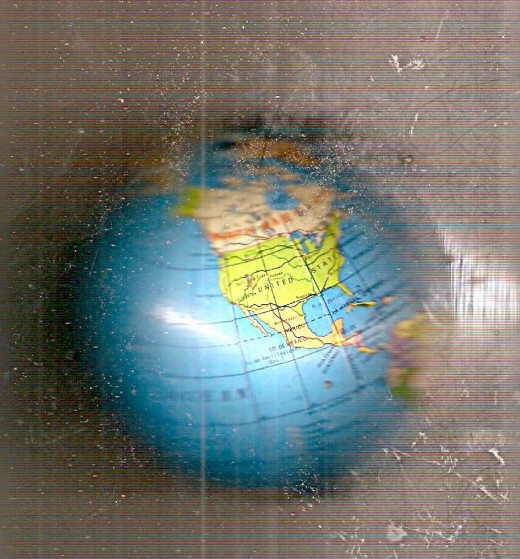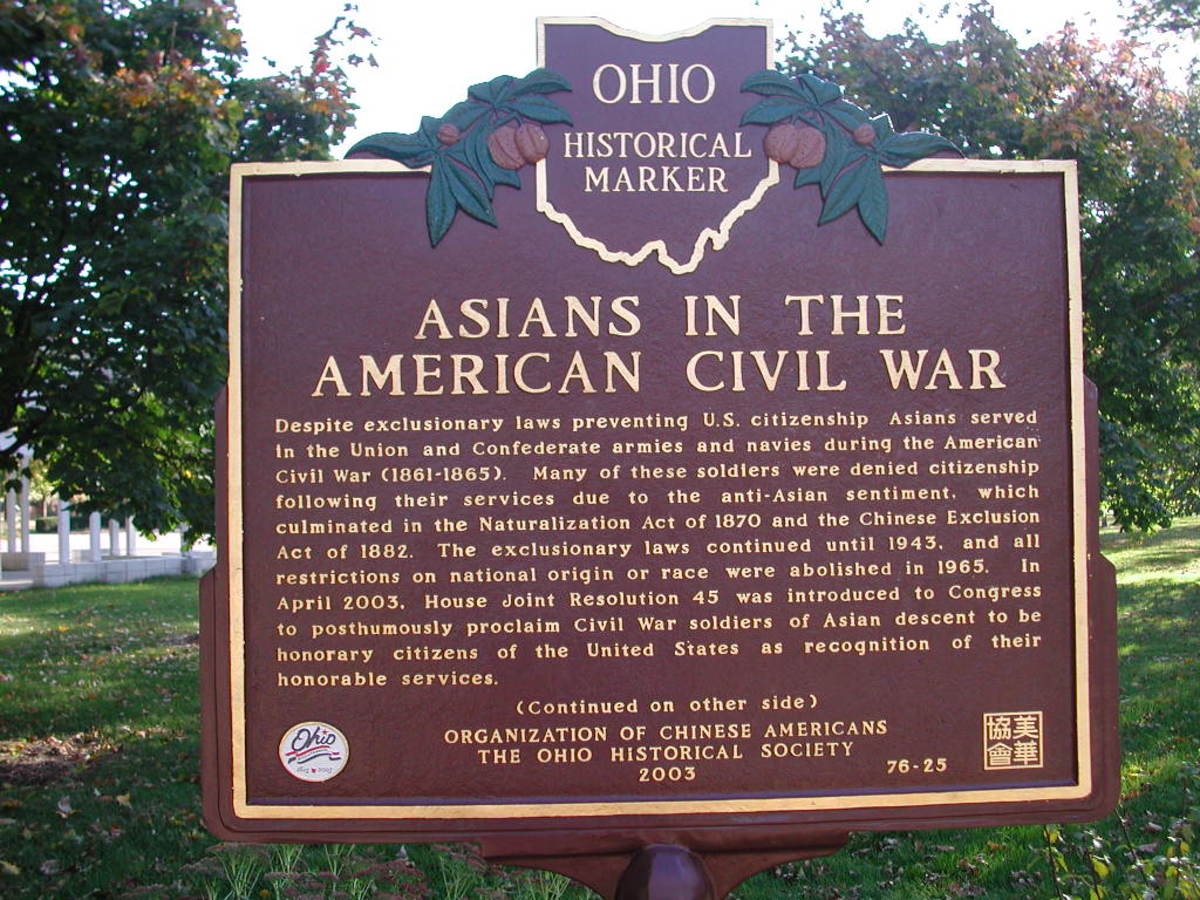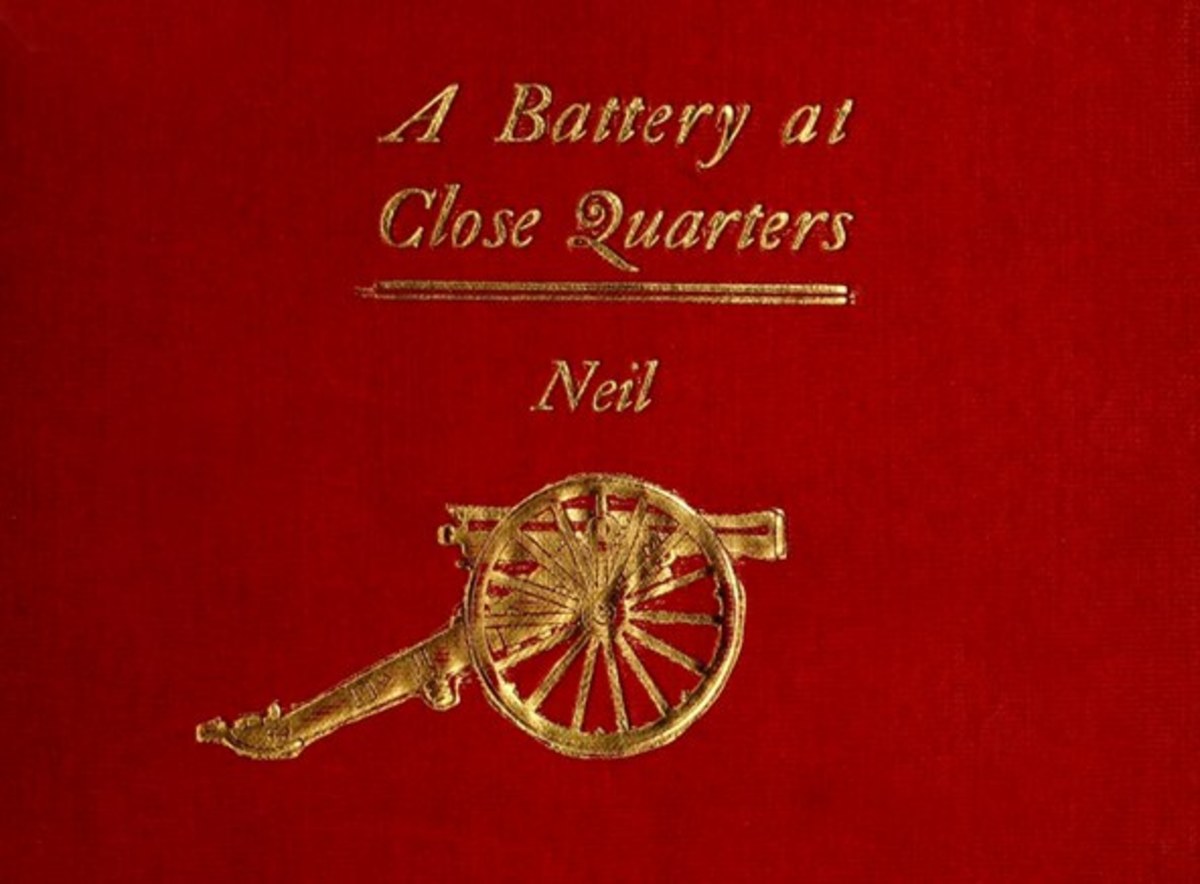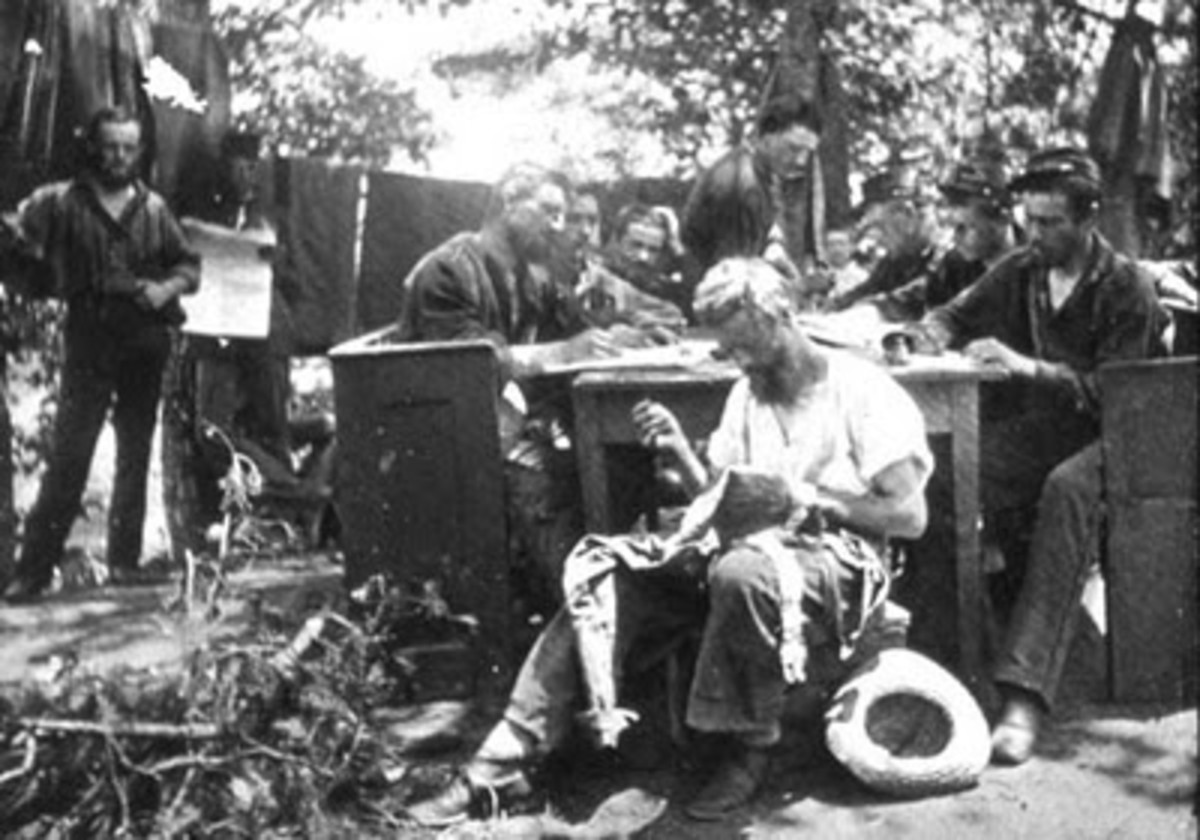- HubPages»
- Education and Science»
- History & Archaeology»
- History of the Americas»
- American History
American Civil War: How Did the North Preempt Britain and France from Intervening for the South?
It was almost divided into United States of America and Confederate States of America

American civil war
If Britain and France believed they would gain from the American Civil War they would go to war with the United States
By Conrado D. Fontanilla
Magnets of war with foreign nations
What are the events that could make the United States of America go to war with Britain or France during the American Civil War?
One: Recognition of the Confederate States of America by Britain and France.
Two: Active assistance to the Confederate States of America by Britain and France.
Three: An offer as mediator between the Confederate States of America and United States of America by Britain or France.
Four: Doing commerce with the Confederacy.
The fourth is the mildest yet it could be considered as a virtual declaration of war against the United States. It should be emphasized that the United States did not intend to provoke war with Britain or France or with any other country. But any foreign nation with an interest to see a weak U.S.A. could see the American Civil War as an opportunity to strike.
During the 1860s nations that could be considered as world powers were Britain, France, Russia and the United States of America. Of the four, Britain was ahead of France, which was more likely to take the lead of Britain.
Fortunately, Russia was friendly to the United States from the start of the American Civil War through to the end. Russia did not wish to disturb the prevailing equilibrium in world politics.
“Russia entertains for the United States of America a lively sympathy founded on sentiments of mutual friendship and on common interests. She considers their prosperity necessary to the general equilibrium” (Donald, D.H. editor. Why the North Won the Civil War. 1996:61).
But Britain and France were fidgety as both had commerce to protect in North America plus the fact that either of them was capable of playing world power games. The game was to add a new nation (like the Confederate States of America) to the power equation and make it an ally while not provoking the United States of America into turning as one’s enemy. At that time only Britain, France and Russia had the resources to go to a war of aggression, or defend themselves in case of war, with the U.S.A.
Britain was averse to the democratic experiments of the United States. It had been wary of the republican adventure of the French revolution in 1799 that guillotined a king and graduated into the Napoleonic era. Besides, U.S.A. is a nation that severed itself from Britain through a revolution a century earlier. A break up of U.S.A. was more likely to result in the dissolution of the Monroe doctrine.
Former U.S. President James Monroe made it a foreign policy since December 1823 that, among others: “ the Western Hemisphere was closed to future colonization…”any attempt by a European power to oppress or control any nation in the Western Hemisphere would be viewed as a hostile act against the United States” (Encyclopedia Britannica 2009). The doctrine defanged would allow the recolonization of the western hemisphere, especially former colonies of Spain, by European countries.
France came to the aid of the rebelling American colonies officially in 1778 that ended in 1783 with the birth of the United States of America.
Foreign policy of U.S.A.
The position of the United States was that there is no new nation within its territory, only “combinations too powerful to be suppressed by the ordinary course of judicial proceedings, or by the powers vested in the Marshals by law” (Lincoln, A. Proclamation on April 25,1865. Harper’s Weekly, April 27.1861).
The “Militia of the several States” of the Union raised to a strength of 75,000, was called to suppress it. “Union” was used to mean the United States of America, not in the context of having a “South” as that would have been a tantamount recognition of the Confederacy. Anyway, “North” and “South” are popularized terms and are used as such in our discussion.
The foreign policy of the U.S.A was that any nation that recognized the Confederacy is an enemy of the U.S.A. This was clearly spelled out by the William H. Seward, Secretary of State, that Lincoln adopted. An official attempt to mediate between the U.S.A. and Confederacy is a de facto recognition of the Confederacy. It was easy to see that the basis of mediation was a separation of the Confederacy from the Union.
The declaration of neutrality toward the U.S.A. and Confederacy by Queen Victoria of Britain in May 1861 was considered with a modicum of alarm on the part of the U.S.A. Declaration of neutrality was a calculated move to protect shipping in the international waters in North America, especially in the vicinity of the belligerents. Brazil, Netherlands, France and Spain followed Britain’s lead.
The offer by France to mediate in February 1863 was viewed as foreign intervention by the U.S.A. Seward was firm; he fired a diplomatic note:
“If any European power provokes war, we shall not shrink from it.”
“Seward repeated ceaselessly his contention that the United States was one, and that the nations of Europe should not view themselves as neutrals between two imaginary belligerents in America, but as friends of the United States” (Donald, D.H. editor. Why the North Won the Civil War. 1986:64).
Seward and Lincoln must have learned a lesson from the American Revolution. Early on, that war for independence of the 13 colonies was actually a civil war in the British empire. But in 1778 France officially supported the rebels with its navy and army. Spain joined the war on the side of the colonies in 1779; then the Netherlands followed suit in 1780. Thus the erstwhile civil war turned into an international war. Spain and the Netherlands did not send armies or navies to America but stalemated the British in European seas. The French navy got the better of the British navy in American seas while the navy of the colonies played the role of privateer (Encyclopedia Britannica 2009). The American civil war should not turn into an international war.
For about two years into the American civil war, a blockade runner and privateer Alabama inflicted damage to ships of the North. Britain built ironclad ships for the South. Through diplomacy the North stopped Britain from selling ships to the South.
Diplomacy has a role to play in foreign policy but policy could be enforced by power. How then could the United States discourage the use of armed power by Britain and France to attain their aims? There were levers that the Union could manage, as follows:
Civilian leadership
Lincoln was clear headed and decisive. The members of his cabinet were largely in agreement except on the post-war attitude toward the South. Lincoln did not want to punish the South after the war; Edwin M. Stanton, Secretary of War, wanted them punished. Anyway, decision and action on a policy was to be reached in the future yet, assuming that the North won the contest.
Lincoln was a surprisingly good executive in the sense of how Peter F. Drucker in his book “The Effective Executive” defines one: an executive does his job through other people. Results are the measures of performance not effort. The North had an edge over the South in this lever. Jefferson Davis, provisional president of the Confederacy, was criticized by Alexander Stephens, Vice-president of the Confederacy, as weak, obstinate, timid and vacillating. Stephen suggested that cotton be shipped to Europe, stored there and wait for a good price then sell it; some of the proceeds should be used to buy additional ship. His suggestion fell on deaf ears.
Lincoln had plenty of rope to suppress the South through presidential powers. Congress convened only in July 1861. To break up a riot in Baltimore he imposed martial law. Lincoln ignored a ruling by Chief Justice Taney (ex parte Merryman). There was censorship of the press. Suspected of disloyalty, several dissenters were imprisoned. The critic, Congressman Vallandigham, was banished to the South. In New York riots of racist tone were broken up.
[So far I have two Triond contents on American Civil War.]
Military leadership
As president of the South, Davis was also commander-in-chief of the armed forces. But he also wanted and did act as commander in fact. Of course, he was a graduate of West Point and was a colonel before he went for a career in politics. In fact he was regarded as a national hero for leadership in the Mexican-American war “for winning the Battle of Buena Vista (1847) with tactics that won plaudits even in the European press.” He was secretary of war under President Franklin Pierce in 1853. But if his military background qualified him for the post it also overburdened him; besides who was there to overrule him or dare to suggest alternatives?
The generals and lower-ranked officers of both the North and South were products of West Point so that they cancelled each other out in terms of military qualifications.
Lincoln’s lack of West Point tutoring was an edge in that he did not share the West Pointer’s bigotry over capture of territory in military strategy. Gen. George McCLellan’s maneuvering to capture territory lead to his defeat. Lincoln adopted Gen. Winfield Scott’s anaconda strategy (developed with Gen. MClellan’s inputs) and coupled it with destruction of armies instead of capture of territory. (Anaconda is a giant snake that kills its prey by constriction.) Scott’s anaconda “… called for a Union blockade of the Confederacy's littoral as well as a decisive thrust down the Mississippi River and an ensuing strangulation of the South by Federal land and naval forces” (Encyclopedia Britannica 2009). Lincoln must have read about the destruction of the army of Gen. Charles Cornwallis of Britain by Gen. George Washington’s and French armies in 1781 which was the last battle of the American revolution.
Lincoln retired Gen. Scott who was then 75 years. The times when Lincoln acted as his own army commander he was in search for a general who adopted the doctrine of “destroy-the-army.” He found one in Gen. Ulysses S. Grant who was under Gen. Henry W. Halleck as army commander. Halleck objected to Grant’s appointment as one who drinks a lot too many. To which Lincoln retorted that if Grant’s drink made him win battles other generals should drink it too, according to Drucker.
If Lincoln appeared to meddle with his commanders it was more of prodding them to employ the destroy-the-army strategy. He gave more lease to Gen. Grant, whom he appointed as commander in 1864, more than the rope Davis gave to Gen. Robert Lee. “Davis never allowed him a post of overall command” such as all the commanders of Lincoln enjoyed. When the Confederate congress promulgated the office of general in chief intended for Gen. Lee, Davis rejected it (Donald, D. H. editor. 1996:103).
When Gen. Grant showed Lincoln his battle plan that incorporated the Scott’s anaconda cum destroy-the-army, the President reportedly said: “Those not skinning can hold a leg” (Williams, T. Harry. The Military Leadership of North and South, in: Why the North Won the Civil War. 1996:57).
Davis had combined in himself the political and military leadership but instead of a plus for the South, it was a flaw in the way he conducted himself. He and his commanders never outgrew their West Point textbooks, whereas the commanders of the North developed into modern generals.
The South carried the idea of democracy too far; the soldiers of each platoon voted for their own leader. Desertion and disobedience was rampant. Davis was never allowed to declare martial law even when the enemy was already at their doorsteps, for example, when Gen. McClellan was breathing down on Richmond, the capital of the South. Davis was allowed to suspend the writ of habeas corpus only thrice.
The strategy of the South could be likened to a punching bag. Inside the overall bag are smaller bags that correspond to states of the South. Each state wanted its own army as bodyguard. South states did not help each other, instead each wanted to enlarge its own army at the expense of the overall body guard. A punching bag does not expand, exactly as the South intended to do; not to take territory but to maintain the original shape of the whole bag. Puncture one small bag and the size of the overall bag will sag, the same effect brought on by constriction from the anaconda. It is easier to puncture smaller bags than the whole bag all at once. Taking control of the Mississippi river, the North split the Southern armies.
A state of the South to keep its own army body guard was an offshoot of state’s right as more sovereign over the Confederacy.
In Georgia, Sherman’s March to the Sea spanned 500 miles. Having secured Georgia and Tennessee for the Federals, Gen. Sherman marched toward the Carolinas defended by Gen. Joseph E. Johnston’s army.
What Gen. William T. Sherman did in his March to the Sea with some 60,000 troops was to puncture smaller bags. In the meantime, the overall body guard of the overall bag, the army commanded by Gen. Lee was immobilized in north Virginia by a siege erected by Gen. Grant. Gen. Lee could not get any reinforcement from Gen. Johnston because Gen. Sherman engaged him. After nine months of siege, Gen. Lee surrendered to Gen. Grant without the approval of President Davis. In a few days, Gen. Johnston surrendered to Gen. Sherman.
“An 88-mile (142-km) pursuit west-southwestward along the Appomattox River in Virginia ensued, with Grant and Meade straining every nerve to bring Lee to bay… When Lee's final attempt to break out failed, he surrendered the remnants of his gallant Army of Northern Virginia….” (Encyclopedia Britannica 2009).
Gen. Grant shared the rations of his army with the fallen soldiers of the South who were also allowed to keep their mules and horses.
Gen. Lee surrendered to Gen. Grant on April 9,1865 which is considered as the end of the American Civil War. Shortly afterwards, Davis was captured.
Britain and France followed the progress of the civil war. They grew anxious over the defeat of Gen. McClellan in 1862. In February 1863, Napoleon III of France gave notice to Britain that it would offer mediation if Britain and Russia followed suit. Britain replied: “We ought not to venture on mediation unless we are ready to go to war.” Setbacks of the South in Memphis, New Orleans, and Shiloh stalled both countries in offering mediation.
“The blockade of about 3,500 miles (5,600 km) of Confederate coastline was a factor of incalculable value in the final defeat of the Davis government, although the blockade did not become truly effective before the end of 1863” (Encyclopedia Britannica 2009). The blockade was part of Scott’s anaconda.
Political system
The North had a two-party political system. The South had only one party. The North had an edge having the benefit of political maturity.
The constitution of the South is almost a duplicate of the United States constitution except that the state is sovereign over the Confederacy. This proved to be one of the barriers in the conduct of war. The President was given only an "item veto." In Alabama, 44 percent voted against secession. Davis was voted as a "provisional president" of the South for six years, from 1861 to 1866 (assuming that the South could last that long).
Lincoln was reelected in 1864, an indication of approval of his policies.
Bureaucracy
The bureaucracy of the North had been in place for a century. That of the South was still very incomplete. Government machinery was organized in February 1861. Tax collection could hardly be implemented.
Economy
The North was wealthier and had an edge in productive capacity. In real and personal property the North had three to one that of the South; capital in the banks the North had four to one that of the South; and in annual manufactures, the North had ten to one that of the South.
In financing, the North had 13 percent from paper money; 62 percent from bonds; and 21 percent from taxes. The South had 60 percent from paper money; 30 percent from bonds; and 5 percent from taxes (the remainder from miscellaneous sources).
Taxation was resisted in the South.
Paper money from the printing press was responsible for the runaway inflation in the South: 9,000 percent in four years. The North had only 117 percent in the same period. The South did not promote manufacturing thoroughly.
“War invigorated the Northern economy by stimulating a leading form of Northern economic activity, namely industrial production” (Donald, D.H. editor. 1996:94).
Britain and France knew that a country with an unstable economy is not a good partner in commerce. Britain imported grain from the North.
Population
The North had five people to two that of the South.
Territory
The North had 23 states; the South had only 11.
Market
The North, having a better economy (thus purchasing power) and a larger population, was a better market than the South.
Transportation
The South had the longest railroad track. However, it did not control it. In July 1863, the North took control of the Mississippi river, splitting the Southern armies and cutting off supplies for the Southern armies from the west.
Navy
“By the time of Lee's surrender, Lincoln's navy numbered 626 warships, of which 65 were ironclads. From a tiny force of nearly 9,000 seamen in 1861, the Union navy increased by war's end to about 59,000 sailors, whereas naval appropriations per year leaped from approximately $12 million to perhaps $123 million….
“… Only Galveston remained open to the Confederates in the last months of the war. In short, ‘Uncle Sam's web feet,’ as Lincoln termed the Union navy, played a decisive role in helping to crush the Confederacy” (Encyclopedia Britannica 2009).
Cotton
Cotton was a strategic crop which the North and the South knew would favor the South, if:
One – Britain and France would come to the aid of the South because their factories needed cotton to run.
Two – Britain and France could not obtain cotton from alternative sources like smuggling or blockade running or from other countries.
Three – the South could get a substantial income from the sale of cotton.
Cotton in the South in 1861 was worth ten times that of the actual gold supply or $225 million in gold. Sale of cotton could finance purchases from abroad. But the South did not have enough ship to move the futures commodity to Europe. So the South withheld the cotton with the reasoning that Britain and France would break the blockade to get cotton. That is, join the war on the side of the South.
Ironical as it seemed, as the civil war wore on cotton was sold to the North to buy bacon for the Southern army. When Davis approved of this scheme, it was too late to save the South. Cotton smuggling to the North became a lucrative trade. There was a cotton embargo and smuggling at the same time.
“At the end of the war, 2,500,000 bales had been destroyed to prevent them from falling into the hands of the enemy; less than 1,000,000 probably had been exported through the blockade; and an incalculable amount had been smuggled through the lines….” (Donald, D.H. editor. 1996:99).
The British increased production of cotton in India and Eqypt, according to Huber Alastar Packer.
Most of the blockade runners were British crew on the furlough. When the blockade became effective, the wait did not take too long for Britain and France and the South capitulated. Sooner than they thought, they got enough cotton.
Slavery
A moral issue but one that affected the spirit. The North was antislavery; the South wanted to keep slaves. The South was morally the poorer. The spirit affected the willingness to fight, worthy of note among the Negroes: “…By 1865 the Union army included 178,895 colored solders – roughly five times the number of men in Lee’s army when he surrendered at Appomattox.…” (Donald. D. H. editor. Why the North Won the Civil War. 1996:85).
Britain abolished slavery in 1807 yet; Russia turned slaves into serfs in 1679. Jean Bodin (1530-96) of France was an advocate of antislavery (Encyclopedia Britannica 2009).
In the North, the Confiscation Act of August 1861 opened an opportunity for slaves to escape. Slavery was abolished in the District of Columbia and Western Territories by Congress in 1862 (Geise, R.D. ed., American History to 1877). Lincoln issued a slave emancipation proclamation on the first day of 1863. It freed slaves in the South. Being anti-slavery Britain and France were mollified on their threat to recognize the Confederacy. It would be a diplomatic embarrassment to say the least, at worst an inconsistency if they did, the South being founded on state's right to hold slaves.
These were the levers that the United States of America could manipulate. The fact that Britain and France (and other minor powers) went only so far as to declare neutrality between the North and the South mean that the United States had handled these levers successfully.
The United States only had to show that it could govern to preempt any attempt on the part of any foreign nation to make war with it while it was engaged in its own civil war. It proved its capability to govern.




